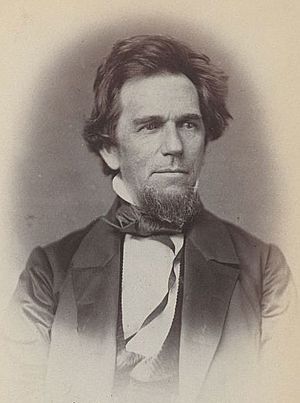Warner Underwood facts for kids
Quick facts for kids
Warner Underwood
|
|
|---|---|
 |
|
| United States Consul to Glasgow, Scotland | |
| In office July 17, 1862 – September 30, 1864 |
|
| President | Abraham Lincoln |
| Member of the U.S. House of Representatives from Kentucky's 3rd district |
|
| In office March 4, 1855 – March 3, 1859 |
|
| Preceded by | Francis Bristow |
| Succeeded by | Francis Bristow |
| Member of the Kentucky Senate | |
| In office 1849-1853 |
|
| Member of the Kentucky House of Representatives | |
| In office 1848 |
|
| Personal details | |
| Born |
Warner Lewis Underwood
August 7, 1808 Goochland County, Virginia |
| Died | March 12, 1872 (aged 63) Warren County, Kentucky |
| Resting place | Fairview Cemetery |
| Political party | American |
| Other political affiliations |
Whig |
| Spouse | Lucy Craig Henry |
| Relations | Brother of Joseph Rogers Underwood |
| Children | Fanny Underwood Grider, Lucy W. Underwood McCann, Juliette Western Long, Josie Underwood Nazro, Henry Underwood, Warner Underwood, Mary Underwood Crump |
| Residence | Mount Air plantation |
| Alma mater | University of Virginia at Charlottesville |
| Profession | Lawyer |
| Signature | |
Warner Lewis Underwood (August 7, 1808 – March 12, 1872) was an important figure in Kentucky history. He was a lawyer, a state lawmaker, and a U.S. Representative for Kentucky. Like his older brother, Joseph Rogers Underwood, he supported the Union (the northern states) during the American Civil War. During the war, he worked as a U.S. Consul in Glasgow, Scotland.
Contents
Early Life and Family
Warner Underwood was born in Goochland County, Virginia, on August 7, 1808. His father, John Underwood, fought in the American Revolutionary War. Warner had several older brothers and sisters. His older brother, Joseph Rogers Underwood, had moved to Kentucky before Warner was born and also served in Congress.
In 1825, Warner Underwood moved to Bowling Green, Kentucky. He later returned to Charlottesville, Virginia to study law at the University of Virginia. He finished his law studies in 1829.
In 1831, he married Lucy Craig Henry in Bowling Green. They had eight children who grew up, including Fanny, Lucy, Juliette, Josie, Warner, Henry, and Mary.
Warner Underwood's Career
After finishing law school, Underwood returned to Kentucky. In 1830, he started his own law practice in Bowling Green. This city was a busy trading center between Louisville, Kentucky, and Nashville, Tennessee.
For a short time in 1834, Warner Underwood moved to Texas. He worked there as a U.S. attorney. However, he returned to Bowling Green in 1840. He had planned to move his family to Texas, but the Texas Revolution made him change his mind.
Underwood bought a large farm called Mount Air plantation. It was located near the Barren River and later near a railroad. Besides being a lawyer, he managed his farm. By 1860, he was one of the richest people in the county. He owned land and other property, including enslaved people. He did not like slavery, but he inherited enslaved people and kept them.
Political Journey
In 1848, voters chose Warner Underwood to be a member of the Kentucky state house of representatives. He was a member of the Whig Party. The next year, he was elected to the state senate, where he served until 1853.
Later, Underwood ran for a seat in the U.S. Congress. He won as a candidate for the Know-Nothing Party (also called the American Party). He served two terms in Congress, from March 4, 1855, to March 3, 1859. He was well-known for speaking out against allowing Kansas to join the Union under the Lecompton Constitution. He did not run for re-election in 1858.
During the important presidential election of 1860, Warner Underwood supported John Bell and Edward Everett. They were candidates for the Constitutional Union Party. This party won in Kentucky, but Abraham Lincoln became president. Underwood traveled around Kentucky, telling people not to join the Confederacy.
When the American Civil War started, Kentucky tried to stay neutral. However, Bowling Green was taken over by Confederate troops. Warner Underwood supported the Union, and his farm was destroyed in 1862. His law office building was also ruined. Union soldiers later took or killed much of his farm animals and used materials from his property.
President Lincoln chose Warner Underwood to be the United States Consul to Glasgow, Scotland. This was an important job because Glasgow was a center for cotton trade, and the Confederate states wanted to trade there. He started this job on July 17, 1862, and served until September 30, 1864. He brought his wife and some of his children with him. Part of his job was to report on ships that might be helping the Confederate navy. He did not like this part of the job, so he resigned and returned home with his family.
Life After the War
After the Civil War ended, Underwood and his family returned to the United States. They visited his daughter Lucy in California. In 1866, the Underwoods returned to Kentucky. Warner sold some of his damaged farm, rented a small house, and tried to start his law practice again.
Later Years and Legacy
Warner Underwood had a stroke in 1868 and never fully recovered. He passed away near Bowling Green, Kentucky, on March 12, 1872. He was buried in Fairview Cemetery in Bowling Green.
Many of his personal papers, including a diary written by his daughter Josie, are kept at Western Kentucky University.
Images for kids
 | Kyle Baker |
 | Joseph Yoakum |
 | Laura Wheeler Waring |
 | Henry Ossawa Tanner |

